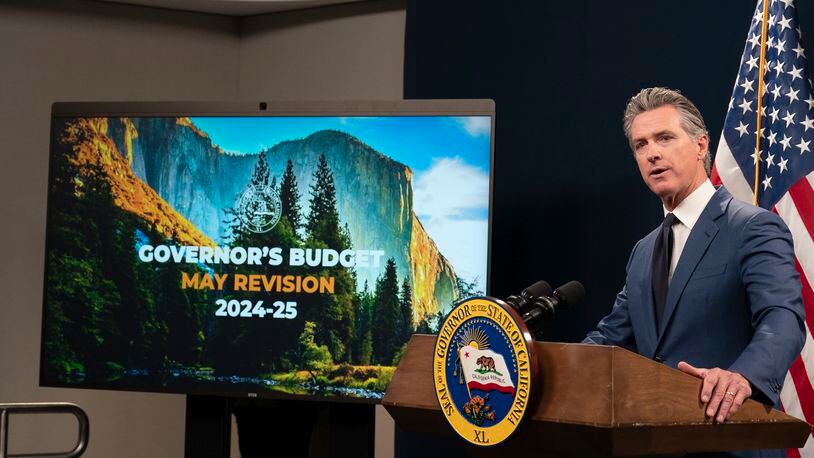The size of the deficit is important as it will shape the national perspectives of Newsom, who is a top surrogate for President Joe Biden's reelection campaign and who is widely believed to harbor presidential aspirations of his own. Newsom has spent much of his time in office basking in the glow of historic budget surpluses that allowed him to greatly expand state spending. But back-to-back budget deficits — with more on the horizon — are testing California's commitment to those increases.
So far, Newsom has not gutted some of his splashiest policy advancements, including free kindergarten for all 4-year-olds and free health insurance for all low-income adults regardless of their immigration status. But as Friday's proposal showed, Newsom is willing to chip away at some of those promises to balance the budget.
While Newsom has not taken away health insurance from anyone, he proposed the state stop paying for health care workers to care for some 14,000 disabled immigrants in their home. That would save the state $94.7 million. While he hasn't pulled back the state's commitment to expanded kindergarten, he proposed eliminating $550 million that would have helped school districts build the facilities they need to teach all of those extra students.
After promising to pay for child care for another 146,000 children from low-income families, Newsom on Friday proposed pausing that expansion at 119,000. And after promising to boost how much money doctor's get to treat Medicaid patients, Newsom on Friday proposed canceling $6.7 billion that had been set aside to do that.
The cuts prompted outrage from across the political and ideological spectrum. Anthony Wright, executive director of the consumer advocacy group Health Access California, said the removal of in-home care for immigrants with disabilities would result in those people becoming “further impoverished or end up in much more expensive nursing home care.”
Yolanda Thomas, a member of the Child Care Providers United negotiations team, said cutting the child care slots means “we cannot build a stronger economy when our lowest paid workers ... don't have somewhere safe to send their children during their shifts.”
For every question on Friday, Newsom had a similar response.
“I prefer not to make this cut. These are programs, propositions that I have long advanced, many of them,” he said. “But you've got to do it. You have to be responsible.”
Before the coronavirus pandemic, California's revenues were growing at about 5% per year. From 2019-20 through 2021-22, revenues grew an astounding 55%. That's because California got a lot of money from the federal government to blunt the impact of the pandemic. And it's because the stock market had historic increases, fueling a rapid expansion of wealth among California's richest residents — generating a tax windfall for the state.
State budgeting is a guessing game, where governors and lawmakers have to predict how much money they will have and plan to spend it. Following the bountiful years of the pandemic, California's guesses have been way off. The Newsom administration now predicts state revenues will be $83.1 billion lower than they thought for the 2022-23 and 2023-24 fiscal years.
“If you knew that those were unrealistically high and totally unsustainable revenue levels, why wouldn't you put a little bit more in the reserves,” said state Sen. Roger Niello, a Republican and vice chair of the Senate Budget and Fiscal Review Committee. “If that's the case, you know it's going to come crashing down and you are going to have a big deficit to cover.”
Newsom defended California's previous budget actions, noting the state Constitution required the state to return a big chunk of that surplus to taxpayers in the form of rebates. Newsom said it "provided a lot of support at the time to people who needed money."
“I feel like we were doing the best we could under that circumstance,” he said.
Newsom on Friday repeatedly vowed he would not sign a sweeping tax increase on individuals. But he did propose suspending a popular tax deduction for businesses, which many see as a tax increase.
In total, Newsom is proposing $32.8 billion in cuts over two years, including eliminating 10,000 unfilled state jobs and an 8% cut to state operations — including things like eliminating landlines. He promised there would be no layoffs, furloughs or salary cuts for the state's more than 221,000 state workers.
Democratic legislators applauded Newsom’s effort to deal with multiple years of deficits and vowed to protect spending for social safety net fundings and classrooms.
“Nobody knows what challenges California may face, so we must always stay prepared,” Assembly Speaker Robert Rivas and Assembly Budget Chair Jesse Gabriel said in a joint statement. ___ This story has been corrected to show that Newsom proposed eliminating $550 million for school facilities, not $500 million.
Credit: AP
Credit: AP
Credit: AP
Credit: AP
Credit: AP
Credit: AP
